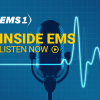Download this quick clip on iTunes, SoundCloud or via RSS feed
In this week’s Inside EMS podcast, hosts Chris Cebollero and Kelly Grayson discuss a response times in light of a recent EMS shortage that’s forcing San Francisco Fire to hire private ambulances.
“We’re not picking on San Francisco, but this looks to be the tip of the iceberg,” Grayson said. “This is not an uncommon problem.”
San Francisco is working get their response time to under 10 minutes, but Cebolloero discusses the lack of research behind response time compliance, saying there needs to be more data around how it affects patient care, and ties into an increased call volume.
They also discuss the EMS1 column “Should EMS stop prolonging death?” by Steve Whitehead, who suggests it might be inappropriate to transport a dying patient to the hospital.
“I think we really have to ask ourselves this question,” Cebollero said. “Not only are we transporting a patient that’s dead to a hospital, but we’re doing it under lights and sirens, we’re running through the red lights — hopefully with due regard — we are putting our crew at risk, we’re putting bystanders at risk, and for somebody that nine times out of 10, we’re not able to save.”
And they sympathize with Detroit Fire, which amid financial struggles has been using doorbells, pipes and other handmade gizmos — one involving a soda can that gets tipped over by an incoming fax to signal and there’s an emergency.
In The Clinical Issue, they discuss Chicago’s Food Allergy Research and Education Summit, and how to get more epipens in the community to save the many children who are dying from food related allergies.
They also talked about best practices for treating anaphylaxis patients.
Experts suggested that rather than giving epinephrine subcutaneously in the arm, it should be given intramuscularly in the leg followed by a massage for 30 seconds. They also said that Benadryl should not be considered an emergency treatment drug for allergic reactions.
They also bring in Bob Loftus, president of the National EMS Museum, who shares the importance of the history of EMS, and how current providers can contribute to keeping it alive for future generations..
Here are links to some of the articles and other items mentioned on the show:












